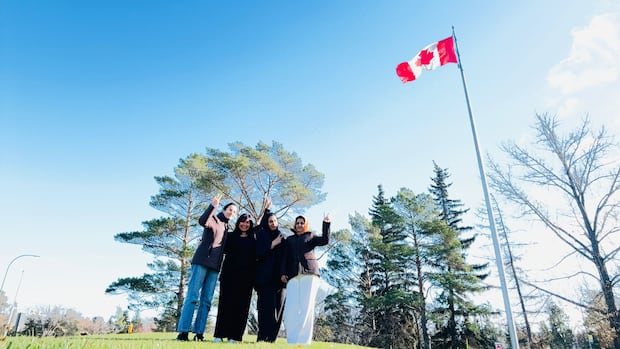Spogmai Hashemi says when she stepped outside Regina’s airport and felt the cold Saskatchewan breeze hit her face, she was immediately hit with a sense of nostalgia and homesickness. Unlike Qatar, where she had been living, both Canada and Afghanistan — where she’s originally from — have cold winters.But Hashemi says she was also filled with a feeling of safety after finally reaching Canada. “I know where I’m standing. I’m in a safe land and I’m on land of right and freedoms,” Hashemi said. It was the end of a long journey that started years earlier in Kabul, at the American University of Afghanistan, before the Taliban resumed power. The 2021 takeover forced Hashemi and her fellow students to flee to Qatar in order to pursue their degrees. She and dozens of other women were attending universities in Qatar on scholarships completely funded by the U.S. Agency for International Development, or USAID, program. With its closure earlier this year, they were at risk of being deported back to Afghanistan, where girls can only attend school up to Grade 6 and women are barred from universities — rules the women had broken in Qatar. “Even when I was inside the airplane, I was still thinking maybe something will happen,” said Hashemi, describing her anxiety on the flight to Regina, as she worried there would be further immigration issues. Instead, Hashemi and two other Afghan scholars were met at the airport by University of Regina staff and were greeted with hugs from Friba Rezayee, the woman who spearheaded the efforts to get them to Saskatchewan.Friba Rezayee, centre right, poses with Spogmai Hashemi and two other young women she spent months trying to get to Canada at the University of Regina on Oct. 31, 2025. Rezayee says she dressed as a U of R student for the girls’ first Canadian Halloween. (Katie Swyers/CBC)The three women will start classes at the U of R in January. They are the first of 25 to 30 Afghan women whom Rezayee’s non-profit, Women Leaders of Tomorrow, and the university are hoping to bring to Saskatchewan. “They were in a dire, critical, horrible situation,” said Rezayee. “Qatar doesn’t have any pathway for resettlement for refugees.”Even working as a woman in the Middle Eastern country can be difficult, she said. The U of R’s Project Resilience scholarship program — which helps students affected by war or political violence in their home countries study at the school — and Women Leaders of Tomorrow were able to raise more than $815,000 to bring the women to Saskatchewan. But between political red tape and Canada’s cap on international students, Rezayee said getting the first three students to Regina was “very difficult.”Between the politics, fundraising and multiple setbacks, “this is definitely one of the biggest challenges I’ve ever taken on in girls’ education and women’s education in Afghanistan,” she said.An Afghan herself and one of that country’s first two female Olympic athletes, Rezayee created the Vancouver-based Women Leaders of Tomorrow to help pair Afghan girls with scholarships in the U.S. and Canada. The federal government’s cap on international student visas — which saw 36,417 international study permits issued from January to June of this year, compared with 125,034 the year before — is “very unfair and unjust,” said Rezayee, who says the Afghan women’s situation differs from other international students.With limited resources in European countries and the shift in U.S. international policy, “Canada is the only hope” for the women, she said.”The world is abandoning Afghan women and girls,” she said. “It’s very unfair and it makes me angry.”Rezayee, right, met Hashemi and the two other women at Regina’s airport and spent the end of October helping them settle into their new lives. Seeing them arrive in Canada was ‘precious and priceless,’ she says. (Submitted by Spogmai Hashemi)When the women reached out to her from Qatar, after they lost their scholarship funding, Rezayee said she knew she had to help, but also knew she would need public support. “I was hopeful that there is going to be a solution for them, because there has to be,” she said. “We couldn’t just ignore 30-plus Afghan women in a dire, horrible situation.”After she reached out to universities across the country, “the only university who stepped up was University of Regina and Project Resilience,” said Rezayee.Ethical imperative to help: U of RUniversity of Regina president Jeff Keshen said the school felt an ethical imperative to help. “These young women were in desperate circumstances. We have the ability to house them on campus, to feed them on campus,” he said. Keshen said it was a relief when the first three women made it to Regina at the end of October. But there was “a great deal of frustration” with the bureaucracy of processing their visas and the “very slow and sometimes cumbersome [immigration] process,” she said.”These women were really in limbo, and in many cases there’s a number who are still in limbo,” he said. While three more women are currently in the visa approval process to come to Regina, according to the U of R, many more still remain in Qatar, most with precarious visa status. WATCH | Afghan women facing deportation from Qatar now in Regina:Afghan women facing deportation from Qatar are now in Regina to continue studiesDozens of women are facing deportation from Qatar after the closure of the USAID program ended their scholarships. Now some of those women have made it to Regina.The university and Rezayee say they are triaging which women come based on who has to leave Qatar first. Keshen said the situation for the women still overseas is “fluid.” Malta has agreed to take some students but there is confusion over how long they can stay there. The same is true for those in Qatar, who face the risk of any day getting notices saying, “I’m sorry, but you can’t stay here any longer and you have to go home,” said Keshen.Thanks to donations from across Canada and abroad, Keshen said there’s “enough money in the pot” to help many more students. A ‘life-changing’ opportunityHashemi says she and the others are grateful to everyone who helped and for “every penny” that was donated. “It really means a lot for us. It’s a hope for us that we are not forgotten — we are not left behind,” she said. She wants to make the most of her opportunity and one day give back to Canada, she said.Before the Taliban resumed control of Afghanistan in 2021, Hashemi was studying political science and aspired to be a diplomat, serving her country abroad. She now plans to pursue her public sector dreams in Canada, she said. “I want to contribute to your community … no matter where I am, which level I’ll be working, even if I’m a public servant or if I’m going to be a simple teacher somewhere.”But Hashemi and the two other women say they have not forgotten their friends still abroad, hoping to come. “I hope they get all of them here, because all of them went through a lot and they need … the peace of mind so they can focus on their education,” Hashemi said. The opportunity to come to Canada is more than just education, she said.”It’s life-changing.”
After facing deportation from Qatar following USAID cuts, 3 Afghan women find refuge at U of Regina











